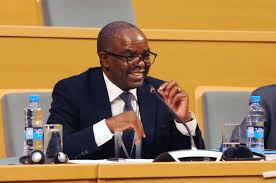By Cecilia Chiluba
Zambia Revenue Authority (ZRA) says revenue leakage and narrow tax bases have hindered development despite abundant mineral resources.
Authority Commissioner General Dingani Banda said it is in this vein that ZRA is digitizing tax administration through a multifaceted approach to curb evasion and expand the taxpayer base.
Mr. Banda stated that another intervention involves implementation of progressive taxpayer segmentation, ensuring that micro-enterprises are not overburdened while high-net-worth individuals and multinationals pay their fair share.
Speaking in Lusaka during the 4th Sub-committee on Tax and Illicit Financial Flows (IFFs), of the Specialized Technical Committee on Finance, Monetary Affairs, Economic Planning, and Integration, he added that the Authority is also linking taxation to service delivery through strengthened social contract with the citizenry.
“Citizens rightly demand accountability, every Kwacha collected must translate into tangible improvements in healthcare, education, infrastructure, and other social safety nets,” Mr. Banda said.
He added that Domestic Resource Mobilization (DRM) is fundamental to the country’s political and economic sovereignty, as reliance on external creditors or volatile commodity markets undermines policy autonomy.
Mr. Banda emphasized that the meeting comes at a pivotal moment for Africa, collectively striving to advance the goals of Agenda 2063, a shared vision for a prosperous, integrated, and self-reliant continent.
“Tax and fiscal policy measures are at the heart of this ambition, serving as the foundation for domestic resource mobilization, economic resilience, and sustainable development,” he added.
He urged stakeholders to focus on actionable strategies to address the challenges of illicit financial flows, strengthen tax administration, and enhance Africa’s influence in global tax governance.
Speaking at the same event, African Union (AU) Acting Commissioner for Economic Development, Tourism, Trade, Industry and Mining Moses Vilakat, revealed that Africa is currently losing approximately US$587 billion each year in Illicit Financial Flows.
Mr. Vilakat, said these resources should be collected and channeled to productive investments in strategic sectors in agriculture, industry, services and infrastructure.
“The work of the Subcommittee is therefore of critical importance to lay the groundwork for fiscal strategies that can reduce dependency, foster accountability, and ultimately fund Africa’s own development priorities with African resources.”
“Your work is enormous as it is critical given that a significant portion of the financing requirement to implement the vision and aspirations of Africa 2063 should come from domestic public resources,” he stated.
The gathering, which will run from 5th to 9th May 2025, has been convened under the Zambia Revenue Authority, African Union Commission, African Tax Administration Forum (ATAF), Tax Justice Network Africa (TJNA), United Nations Economic Commission for Africa (UNECA), and co-organisers.
And Tax Justice Network Africa Executive Director, Chenai Mukumba noted that the current geopolitical context is challenging Africa to strengthen its domestic systems and institutions, moving from reliance to resilience.
“Let’s be honest, the current geopolitical context is challenging us. It’s forcing us to pause and ask: how are we financing our developmental aspirations? How do we move from reliance to resilience? We are being called to look inward with honesty.”
“One of the most significant opportunities before us right now is the process to establish a UN Framework Convention on International Tax Cooperation. This is a moment of pride for us, it was African leadership that helped bring this to the table,” Ms. Mukumba said.



